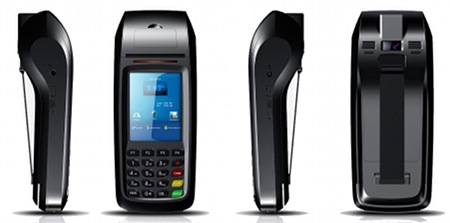Point-of-sale handheld has multiple readers, printer, GPS
Sep 29, 2011 — by LinuxDevices Staff — from the LinuxDevices Archive — 7 viewsViewat announced a handheld computer for point-of-sale (POS) applications, complete with integral smart card and magnetic stripe readers. The EFT-POS VPOS53 has a 1GHz Texas Instruments AM3715 processor, 320 x 240-pixel touchscreen, 256MB of RAM and 512MB of flash storage, plus both a GPS receiver and a GSM/GPRS/EDGE/CDMA cellular modem, according to the company.
Shenzhen, China-based Viewat lists the operating system for its modular EFT-POS VPOS53 handheld as being Windows CE 6.0 R3. A Sept. 28 press release by Texas Instruments (TI), however, touted the device as a reference platform that could be used to develop Linux- or Android-based POS systems.
In any case, the EFT-POS VPOS53 uses TI's 1GHz AM3715, a processor that includes both an ARM Cortex-A8 core and a OpenGL ES 2.0-based PowerVR SGX graphics accelerator. Viewat combines this with 256MB of RAM and 512MB of flash storage, plus a Mini SD expansion slot.

Viewat EFT-POS VPOS53
(Click to enlarge)
According to Viewat, the EFT-POS VPOS53 (above) includes a three-track MSR (magnetic stripe reader) as well as a smart card reader. Possible options include a three megapixel camera, a 1D/2D barcode scanner, and an RFID reader (Mifare A/B), the company adds.
The EFT-POS VPOS53 also comes with a thermal printer, employing paper rolls with an approximate width of 2.3 inches and a diameter of 1.2 inches, the company adds. And history will record exactly where receipts were printed, since the handheld is also said to include a GPS receiver based on the SiRF starIII chipset.
Viewat says the EFT-POS VPOS53 includes a Maxim MAXQ1850 cryptographic controller, ensuring secure storage of customer information. Pre-accredited by RFI Global, this controller already meets Payment Card Industry (PCI) security standards, which can save developers as much as a year of time, TI said in its related release.
Cited communications capabilities for the EFT-POS VPOS53, meanwhile, consist of 802.11b/g/n wireless networking, a GSM/GPRS/EDGE/CDMA cellular modem, and Bluetooth 2.0. A USB port and an RS232 port are also on board, Viewat adds.
According to Viewat, the EFT-POS VPOS53 has a 3.5-inch touchscreen (resistive, almost certainly) with a resolution of 320 x 240 pixels. The device also has 20 keys including a numeric keypad, plus a mono speaker and microphone.
The EFT-POS VPOS53 has a removable, 2000mAh battery whose expected life was not specified. It weighs 1.1 pounds and measures approximately 8.2 x 3.4 x 2.1 inches, says Viewat.
Specifications listed by Viewat for the EFT-POS VPOS53 include:
- Processor — TI AM3715 clocked at 1GHz
- Memory — 256MB of RAM and 512MB of flash storage
- Display — 3.5-inch touchscreen with 320 x 240 pixel resolution
- Keyboard — 20 keys including numeric keypad
- Expansion — Mini SD slot
- Scanning/imaging:
- RFID (Mifare A/B)
- 3-track magnetic stripe reader
- smart card reader
- 1D/2D barcode scanner (optional)
- 3.1 megapixel camera (optional)
- Networking:
- WWAN — GSM/GRPS/EDGE/CDMA cellular modem with SIM slot
- WLAN — 802.11b/g/n
- PAN — Bluetooth 2.0
- Other features:
- GPS receiver
- thermal printer
- Other I/O:
- USB port
- RS232 port
- Battery — 2000mAh
- Operating range — -4 to 122 deg. F
- Dimensions — 8.2 x 3.4 x 2.1 inches
- Weight — 1.1 pounds
Further information
Pricing and availability for the Viewat EFT-POS VPOS53 were not detailed. More information may be found on the EFT-POS VPOS53 product page.
Jonathan Angel can be reached at [email protected] and followed at www.twitter.com/gadgetsense.
This article was originally published on LinuxDevices.com and has been donated to the open source community by QuinStreet Inc. Please visit LinuxToday.com for up-to-date news and articles about Linux and open source.